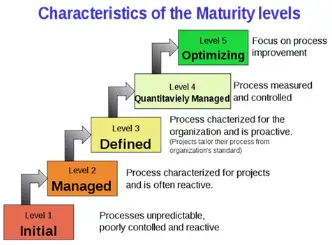 Capability Maturity Model Integration (CMMI) is a process improvement approach that provides organizations with the essential elements of effective processes, which will improve their performance. CMMI-based process improvement includes identifying an organization’s process strengths and weaknesses and making process changes to turn weaknesses into strengths. The CMMI model provides organizations a rating on a numerical scale (1 – 5, with 5 being the highest) and is managed by the Software Engineering Institute (SEI).
Capability Maturity Model Integration (CMMI) is a process improvement approach that provides organizations with the essential elements of effective processes, which will improve their performance. CMMI-based process improvement includes identifying an organization’s process strengths and weaknesses and making process changes to turn weaknesses into strengths. The CMMI model provides organizations a rating on a numerical scale (1 – 5, with 5 being the highest) and is managed by the Software Engineering Institute (SEI).
Definition: Capability Maturity Model Integration (CMMI) is a process-level improvement training and appraisal program run by the CMMI Institute.
CMMI applies to teams, workgroups, projects, divisions, and entire organizations. It’s a collection of best practices that help organizations dramatically improve effectiveness, efficiency, and quality. CMMI offers solutions that help improve an organization’s performance and its ability to meet its business objectives.
Capability Maturity Model Integration (CMMI) Domains
CMMI integrates a number of disciplines into a unified model useful for process improvement. Three (3) domain variations (so-called “CMMI constellations”) of the CMMI exist, one for:
- Development organizations (CMMI-DEV)
- Acquisition organizations (CMMI-ACQ)
- Service-type organizations (CMMI-SVC)
Note: In CMMI version 2.0 these three areas were merged into a single model.
Capability Maturity Model Integration (CMMI) Processes
Every CMMI model contains sixteen (16) core process areas which are:
- Causal Analysis and Resolution (CAR)
- Configuration Management (CM)
- Decision Analysis and Resolution (DAR)
- Integrated Project Management (IPM)
- Measurement and Analysis (MA)
- Organizational Process Definition (OPD)
- Organizational Process Focus (OPF)
- Organizational Performance Management (OPM)
- Organizational Process Performance (OPP)
- Organizational Training (OT)
- Project Monitoring and Control (PMC)
- Project Planning (PP)
- Process and Product Quality Assurance (PPQA)
- Quantitative Project Management (QPM)
- Requirements Management (REQM)
- Risk Management (RSKM)
AcqLinks and References:
- Website: CMMI Institute
- Presentation: CMMC “Securing the DoD Supply Chain Overview – Nov 2019
Updated: 7/30/2021
Rank: G13.5
